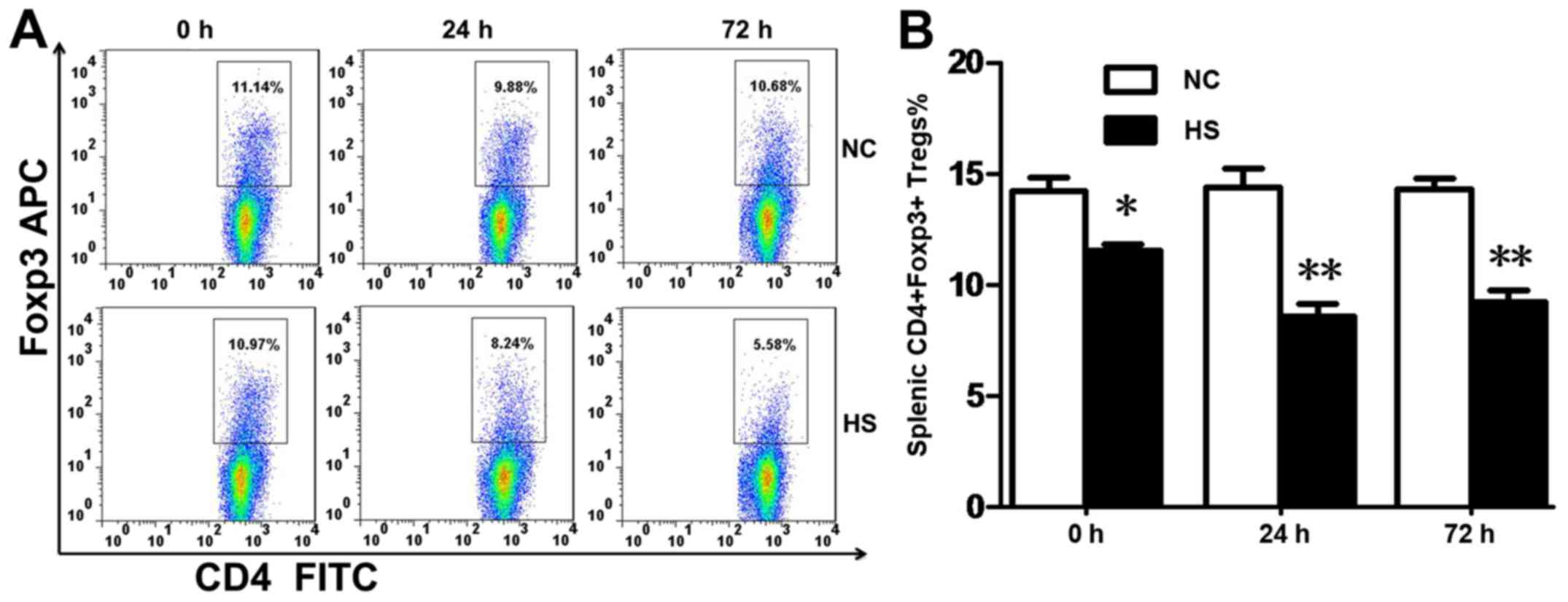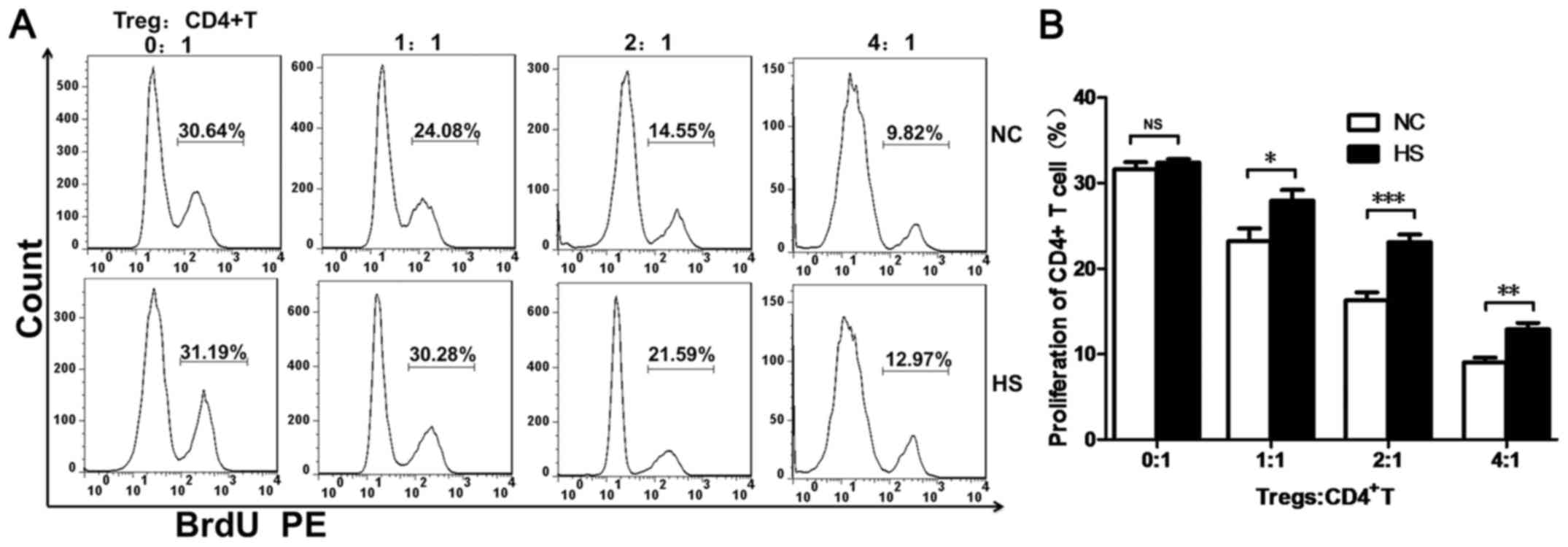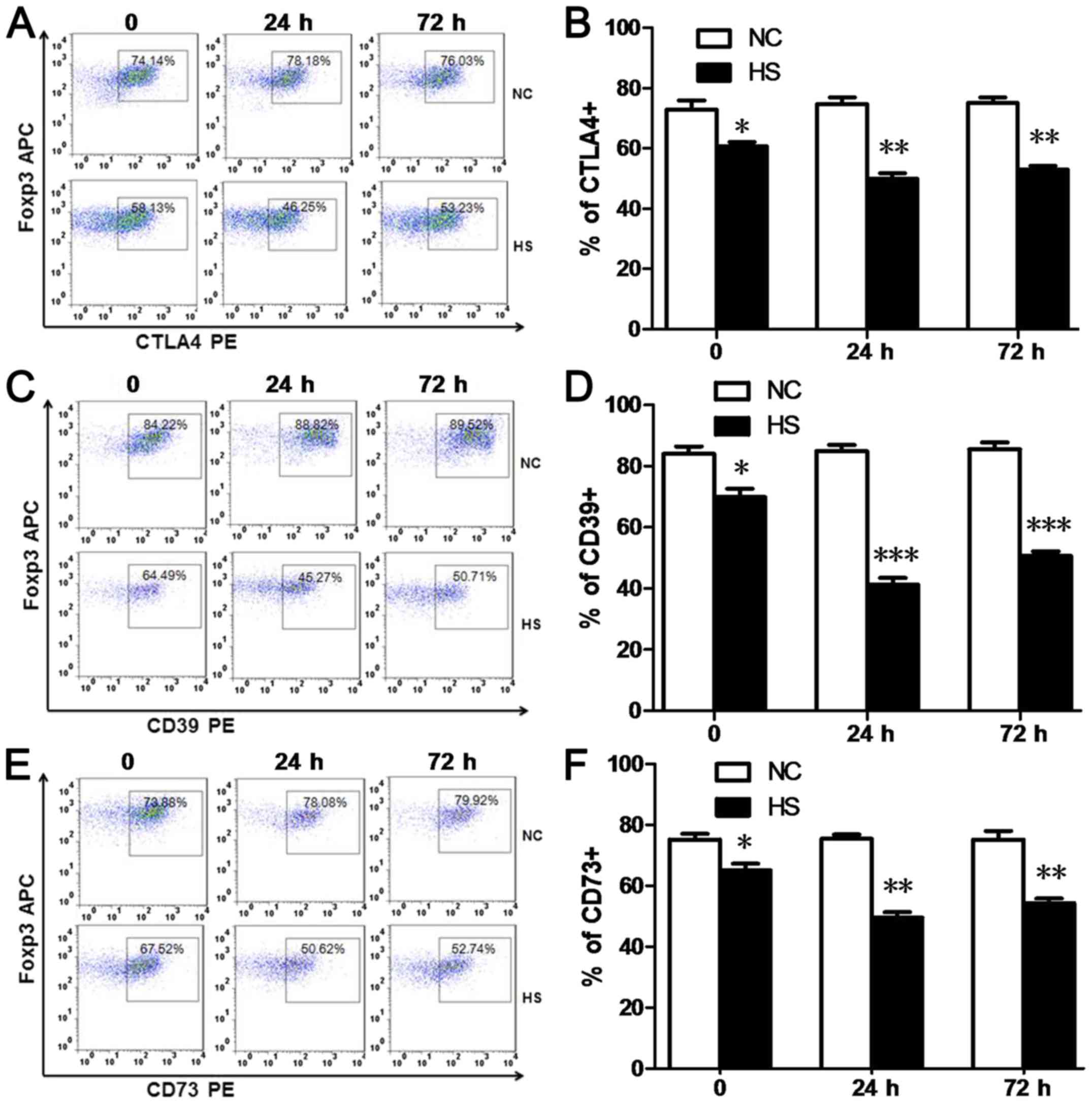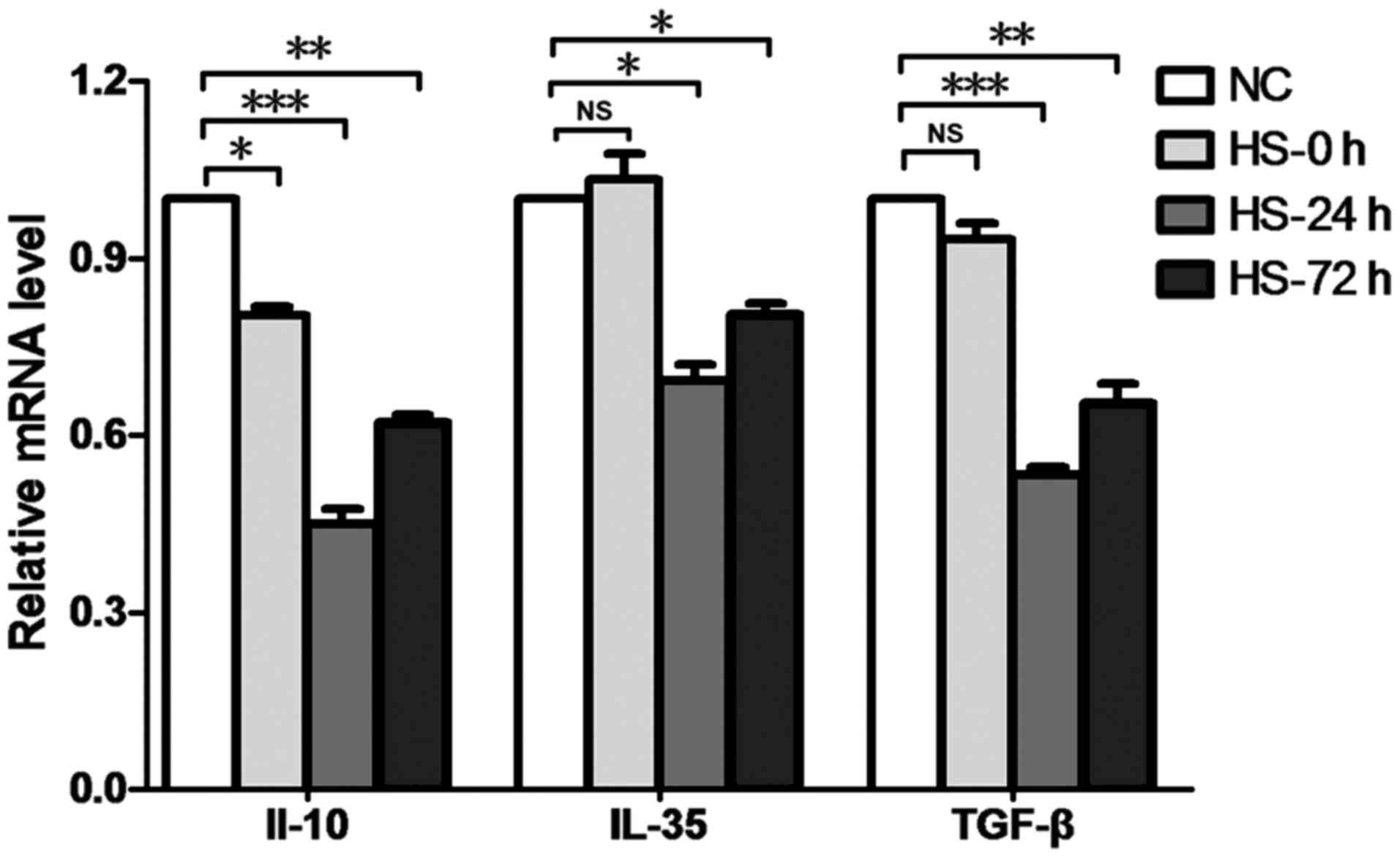|
1
|
Leon LR and Helwig BG: Heat stroke: Role
of the systemic inflammatory response. J Appl Physiol (1985).
109:1980–1988. 2010. View Article : Google Scholar : PubMed/NCBI
|
|
2
|
Leon LR and Bouchama A: Heat stroke. Compr
Physiol. 5:611–647. 2015. View Article : Google Scholar : PubMed/NCBI
|
|
3
|
Hammami MM, Bouchama A, Shail E,
Aboul-Enein HY and Al-Sedairy S: Lymphocyte subsets and adhesion
molecules expression in heatstroke and heat stress. J Appl Physiol
(1985). 84:1615–1621. 1998. View Article : Google Scholar : PubMed/NCBI
|
|
4
|
van der Veeken J, Gonzalez AJ, Cho H,
Arvey A, Hemmers S, Leslie CS and Rudensky AY: Memory of
inflammation in regulatory T cells. Cell. 166:977–990. 2016.
View Article : Google Scholar : PubMed/NCBI
|
|
5
|
Belkaid Y and Rouse BT: Natural regulatory
T cells in infectious disease. Nat Immunol. 6:353–360. 2005.
View Article : Google Scholar : PubMed/NCBI
|
|
6
|
Leon LR, DuBose DA and Mason CW: Heat
stress induces a biphasic thermoregulatory response in mice. Am J
Physiol Regul Integr Comp Physiol. 288:R197–R204. 2005. View Article : Google Scholar : PubMed/NCBI
|
|
7
|
Hu J, Zhang L, Wang N, Ding R, Cui S, Zhu
F, Xie Y, Sun X, Wu D, Hong Q, et al: Mesenchymal stem cells
attenuate ischemic acute kidney injury by inducing regulatory T
cells through splenocyte interactions. Kidney Int. 84:521–531.
2013. View Article : Google Scholar : PubMed/NCBI
|
|
8
|
Livak KJ and Schmittgen TD: Analysis of
relative gene expression data using real-time quantitative PCR and
the 2(-Delta Delta C(T)) method. Methods. 25:402–408. 2001.
View Article : Google Scholar : PubMed/NCBI
|
|
9
|
Csóka B, Németh ZH, Törő G, Koscsó B,
Kókai E, Robson SC, Enjyoji K, Rolandelli RH, Erdélyi K, Pacher P
and Haskó G: CD39 improves survival in microbial sepsis by
attenuating systemic inflammation. FASEB J. 29:25–36. 2015.
View Article : Google Scholar : PubMed/NCBI
|
|
10
|
Haskó G, Csóka B, Koscsó B, Chandra R,
Pacher P, Thompson LF, Deitch EA, Spolarics Z, Virág L, Gergely P,
et al: Ecto-5′-nucleotidase (CD73) decreases mortality and organ
injury in sepsis. J Immunol. 187:4256–4267. 2011. View Article : Google Scholar : PubMed/NCBI
|
|
11
|
Schmetterer KG, Neunkirchner A and Pickl
WF: Naturally occurring regulatory T cells: Markers, mechanisms,
and manipulation. FASEB J. 26:2253–2276. 2012. View Article : Google Scholar : PubMed/NCBI
|
|
12
|
Huang H, Xu R, Lin F, Bao C, Wang S, Ji C,
Li K, Jin L, Mu J, Wang Y, et al: High circulating CD39(+)
regulatory T cells predict poor survival for sepsis patients. Int J
Infect Dis. 30:57–63. 2015. View Article : Google Scholar : PubMed/NCBI
|
|
13
|
Tatura R, Zeschnigk M, Hansen W, Steinmann
J, Vidigal PG, Hutzler M, Pastille E, Westendorf AM, Buer J and
Kehrmann J: Relevance of Foxp3(+) regulatory T cells for early and
late phases of murine sepsis. Immunology. 146:144–156. 2015.
View Article : Google Scholar : PubMed/NCBI
|
|
14
|
Huo R, Wang L, Wang X, Zhao Y, Wang Y,
Zhao X, Chang L, Liu SL, Tong D, Zhang H and Huang Y: Removal of
regulatory T cells prevents secondary chronic infection but
increases the mortality of subsequent sub-acute infection in sepsis
mice. Oncotarget. 7:10962–10975. 2016. View Article : Google Scholar : PubMed/NCBI
|
|
15
|
Chen X, Feng Y, Shen X, Pan G, Fan G, Gao
X, Han J and Zhu Y: Anti-sepsis protection of Xuebijing injection
is mediated by differential regulation of pro- and
anti-inflammatory Th17 and T regulatory cells in a murine model of
polymicrobial sepsis. J Ethnopharmacol. 211:358–365. 2018.
View Article : Google Scholar : PubMed/NCBI
|
|
16
|
Khamri W, Abeles RD, Hou TZ, Anderson AE,
El-Masry A, Triantafyllou E, Bernsmeier C, Larsen FS, Singanayagam
A, Kudo N, et al: Increased expression of cytotoxic
T-lymphocyte-associated protein 4 by T cells, induced by B7 in
Sera, reduces adaptive immunity in patients with acute liver
failure. Gastroenterology. 153:263–276.e8. 2017. View Article : Google Scholar : PubMed/NCBI
|
|
17
|
Wing K, Onishi Y, Prieto-Martin P,
Yamaguchi T, Miyara M, Fehervari Z, Nomura T and Sakaguchi S:
CTLA-4 control over Foxp3+ regulatory T cell function. Science.
322:271–275. 2008. View Article : Google Scholar : PubMed/NCBI
|
|
18
|
Chang KC, Burnham CA, Compton SM, Rasche
DP, Mazuski RJ, McDonough JS, Unsinger J, Korman AJ, Green JM and
Hotchkiss RS: Blockade of the negative co-stimulatory molecules
PD-1 and CTLA-4 improves survival in primary and secondary fungal
sepsis. Crit Care. 17:R852013. View
Article : Google Scholar : PubMed/NCBI
|
|
19
|
Savio LEB, de Andrade Mello P, Figliuolo
VR, de Avelar Almeida TF, Santana PT, Oliveira SDS, Silva CLM,
Feldbrügge L, Csizmadia E, Minshall RD, et al: CD39 limits P2X7
receptor inflammatory signaling and attenuates sepsis-induced liver
injury. J Hepatol. 67:716–726. 2017. View Article : Google Scholar : PubMed/NCBI
|
|
20
|
Wei X, Zhang J, Gu Q, Huang M, Zhang W,
Guo J and Zhou X: Reciprocal expression of IL-35 and IL-10 defines
two distinct effector Treg subsets that are required for
maintenance of immune tolerance. Cell Rep. 21:1853–1869. 2017.
View Article : Google Scholar : PubMed/NCBI
|
|
21
|
Li M, Eckl J, Geiger C, Schendel DJ and
Pohla H: A novel and effective method to generate human
porcine-specific regulatory T cells with high expression of IL-10,
TGF-β1 and IL-35. Sci Rep. 7:39742017. View Article : Google Scholar : PubMed/NCBI
|
|
22
|
Fujio K, Yamamoto K and Okamura T:
Overview of LAG-3-expressing, IL-10-producing regulatory T Cells.
Curr Top Microbiol Immunol. 410:29–45. 2017.PubMed/NCBI
|
|
23
|
Toyama M, Kudo D, Aoyagi T, Miyasaka T,
Ishii K, Kanno E, Kaku M, Kushimoto S and Kawakami K: Attenuated
accumulation of T cells and reduced production of interleukin 10
lead to the exacerbation of tissue injury in a mouse model of acute
respiratory distress syndrome. Microbiol Immunol. 62:111–123. 2018.
View Article : Google Scholar : PubMed/NCBI
|
|
24
|
Gao M, Liu LX, Wu FL, Zhang X, Li YY, Shi
T, Li DZ and Han TT: The changes of Th17/Treg and related
cytokines: IL-17, IL-23, IL-10, and TGF-β in respiratory syncytial
virus bronchiolitis rat model. Iran J Allergy Asthma Immunol.
16:386–395. 2017.PubMed/NCBI
|
|
25
|
Li F, Ji L, Wang W, Hua F, Zhan Y, Zou S,
Yuan L, Ke Y, Min Z, Song D, et al: Insufficient secretion of IL-10
by Tregs compromised its control on over-activated CD4+ T effector
cells in newly diagnosed adult immune thrombocytopenia patients.
Immunol Res. 61:269–280. 2015. View Article : Google Scholar : PubMed/NCBI
|
|
26
|
Mohammadnia-Afrouzi M, Hosseini AZ,
Khalili A, Abediankenari S, Amari A, Aghili B and Nataj HH: Altered
microRNA Expression and immunosuppressive cytokine production by
regulatory T cells of ulcerative colitis patients. Immunol Invest.
45:63–74. 2016. View Article : Google Scholar : PubMed/NCBI
|
|
27
|
Singh K, Kadesjö E, Lindroos J, Hjort M,
Lundberg M, Espes D, Carlsson PO, Sandler S and Thorvaldson L:
Interleukin-35 administration counteracts established murine type 1
diabetes-possible involvement of regulatory T cells. Sci Rep.
5:126332015. View Article : Google Scholar : PubMed/NCBI
|
|
28
|
Tran DQ: TGF-β: The sword, the wand, and
the shield of FOXP3(+) regulatory T cells. J Mol Cell Biol.
4:29–37. 2012. View Article : Google Scholar : PubMed/NCBI
|
|
29
|
Qiao YC, Shen J, Hong XZ, Liang L, Bo CS,
Sui Y and Zhao HL: Changes of regulatory T cells, transforming
growth factor-beta and interleukin-10 in patients with type 1
diabetes mellitus: A systematic review and meta-analysis. Clin
Immunol. 170:61–69. 2016. View Article : Google Scholar : PubMed/NCBI
|
|
30
|
Luan YY, Yin CF, Qin QH, Dong N, Zhu XM,
Sheng ZY, Zhang QH and Yao YM: Effect of regulatory T cells on
promoting apoptosis of T lymphocyte and its regulatory mechanism in
sepsis. J Interferon Cytokine Res. 35:969–980. 2015. View Article : Google Scholar : PubMed/NCBI
|


















